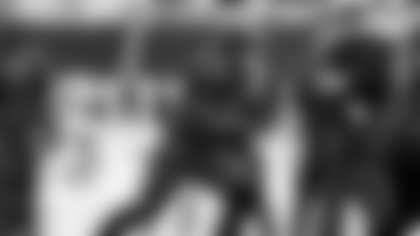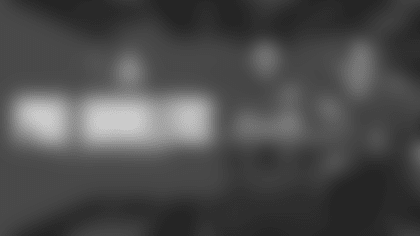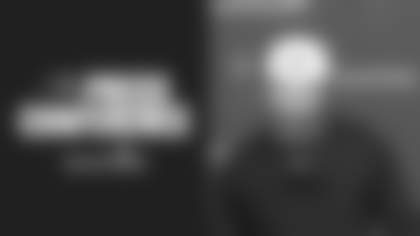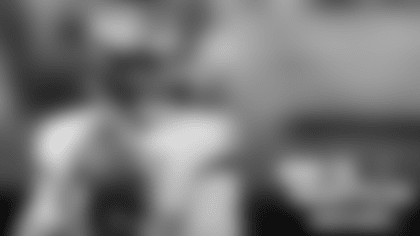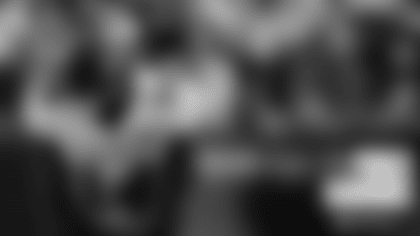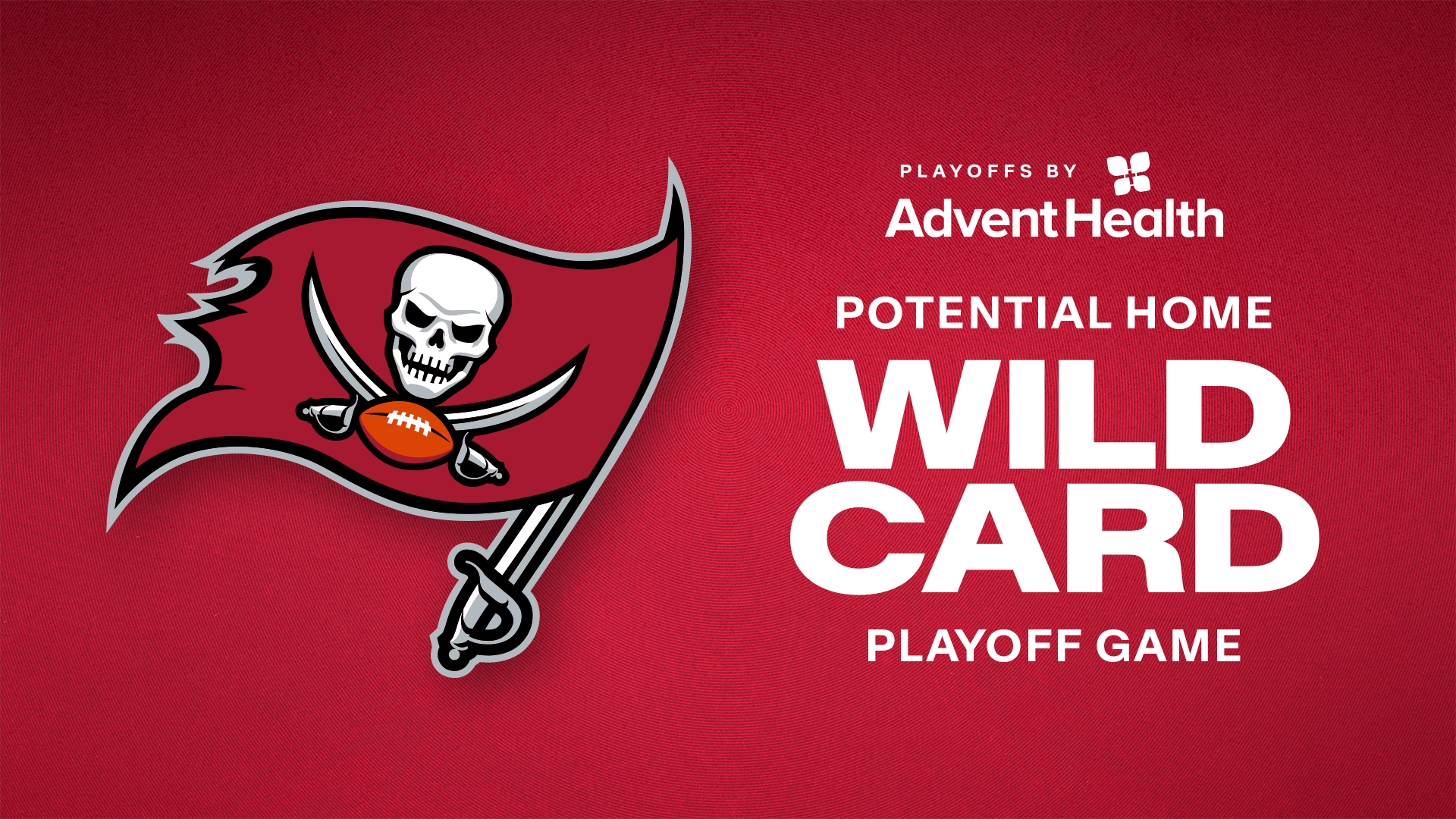The Answer Man was up until midnight on Saturday night watching the opening day of the 2004 playoffs, and I imagine many of you were as well. Amazing stuff, huh?
This was supposed to be the drama-free round, with four road teams thought to have little chance to upend the home clubs on Wild Card weekend. Instead, a pair of division champions went down on Saturday, as St. Louis won at Seattle and the New York Jets won at San Diego.
Both games, incredibly, came down to a pivotal fourth-and-goal play at the end of regulation for the home team, trailing by seven. The Seahawks barely missed their chance; the Chargers did too but got a reprieve on a roughing-the-passer penalty, only to miss a field goal in overtime and eventually lose, too.
The Answer Man sure didn't see that Jets win coming, but that's what is great about the NFL, right? Say it with me: Any...given...Sunday. This league never runs out of surprises.
Along those lines, I have to take a moment to refer back to one of my previous columns, in which I rather shamelessly stumped for [Ronde Barber's Pro Bowl candidacy. The supposition of that column was that, because he had "only" three interceptions in the season at that point, Barber might get overlooked for the all-star game despite his undeniably marvelous 2004 season.
Seems the Answer Man got worked up over nothing. More importantly, this league has surprised me once again. As you surely know by now, Barber was selected for the Pro Bowl team, marking his second trip to Honolulu, along with linebacker Derrick Brooks. Last week, both Barber and Brooks were also named first-team AP All-Pros, if anything an even more prestigious honor.
And, just in case you missed it, there was another piece of good news during Saturday's amazing playoff action. Both Barber and Brooks have been voted in as starters for this year's Pro Bowl. That's a common thing for Brooks, but it's a first for Barber, who was a reserve in 2001.
Of course, there were other Buccaneers who may have deserved Pro Bowl consideration, but that's a common lament on every team. There are only so many spots available. That doesn't mean the Answer Man will necessarily keep a level head about the issue, however...maybe next year I'll be stumping for a Michael Clayton or a Brian Kelly.
For now, however, I'll simply turn to the business at hand – this week's mailbag.
**
- Raul Arias of Bakersfield, California asks:
Why do wide receivers point to the sideline before the ball is snapped?
Answer Man: They're actually pointing at the line judge, not the sideline, Raul. (Or the head linesman, depending on which side of the field they are on.)
On any given snap, the offensive team has to have at least seven players on the line of scrimmage. That includes the five offensive linemen, leaving two of the five backs, tight ends or wide receivers to take up spots on the line. In most formations in which there are more than two receivers or tight ends near the line of scrimmage, at least one will be lined up a yard or so back. There are advantages to being off the line a bit – you can more easily go in motion behind the offensive line and you also have a better chance of avoiding press coverage at the line.
When an offensive team breaks the huddle and goes into formation, the receivers know whether or not they are supposed to be one of the players on the line of scrimmage. Once they take their positions, they check with the line judge, who will confirm that they are lined up on the line, and not too far up or back.
In effect, this becomes something of a ritual for many receivers. They go to the line, signal to the line judge and get ready for the snap. Funny thing here – a former player we asked said this kind of habit can actually get a receiver in trouble, because he forgets to pay attention to the answer. The player may line up too far off the line, signal to the official and get a motion that he should move up. Unfortunately, he's not really paying attention, he never moves up the needed foot and the line judge throws a flag.
Still, it's probably best to check.
**
- Sheldon Clark of Tampa, Florida asks:
Hey Answer Man! I have a question regarding the previous scheduling system the NFL used prior to the addition of the 2002 Houston Texans. Before the Texans arrived, there were only 31 teams in the league. How did scheduling work to fit the one team left over after all other teams had been matched up?
Answer Man: Very delicately.
The league wasn't particularly fond of the 31-team years (1999-2001, from the resurrection of the Cleveland Browns to the addition of the Houston Texans) and was thrilled when Houston made things even again.
Basically, there was at least one team on a bye every week, which was not an ideal situation. The NFL didn't really want any teams on byes during the first few or last few weeks of the season, but with 31 teams there was no choice. The byes were still bunched more toward the middle of the year, but there was one team off each in Weeks 1-2 and 10-17.
That led to a weird situation for the three teams who got first-week byes during that period; they all started in Week Two while the rest of the league was already underway. Even worse was the possibility that a team in the playoff hunt would have a bye on the final week of the regular season. The schedule-makers tried to avoid that occurrence by picking a team that seemed unlikely to be in the hunt, and went with the obvious choice of Cleveland in 1999 and 2000. The Browns were, in effect, an expansion team at the time.
However, in 2001, they choose the New England Patriots, coming off a 5-11 season, for the Week 17 bye. Some of you may recall that the Patriots went on to, um, win the Super Bowl that year. As it turned out, however, the Pats weren't off on the final week of the season, because the 9/11 terrorist attacks postponed the NFL's second week to the end of the season and the Patriots played Carolina on the makeup date in early January. Otherwise, New England would have had three weeks of rest before its divisional Playoff Game.
**
- Shawn Boyer of Fountain Inn, South Carolina asks:
Over and over again we hear TV commentators tell us, "The Bucs have never returned a kick-off for a touchdown in the regular season." This leads me to believe that we could have possibly returned one in the pre-season or the post-season. If so, how many times, who did it, and who was it against?
Answer Man: I think announcers phrase it that way because, like almost everyone, they don't know if the Bucs have ever returned a kickoff for a touchdown in the postseason or preseason. But it does leave that question hanging there, doesn't it?
The answer, Shawn, is rich with irony.
(I know, I know…the word 'irony' is often misused, but let the Answer Man explain why I think it applies here.)
First off, no, there have been no postseason kickoff return touchdowns in Buc history, either. However, the Bucs have a rather healthy five kickoff return touchdowns in preseason play, most recently a 95-yarder by Frank Murphy in the 2002 preseason opener against Miami (Aug. 12). That's five touchdowns on kickoff returns in 123 preseason games, or one about every 25 games, which is roughly a season and a half.
Murphy's score was the first for the Bucs since Yo Murphy (no relation) streaked 93 yards to paydirt against the New England Patriots on Aug. 28, 1999. The last return man not named Murphy to score on a kickoff return for the Bucs was Bobby Futrell, who ran one back 92 yards at Indianapolis on Sept. 5, 1987.
The first two kickoff returns belong to Isaac Hagins, and here's where we get to the irony. Before the Bucs ever took the field for a regular-season game, Hagins, a 5-9, 180-pound receiver with 4.45 40-speed, scored twice on opposing kickoffs. That's right – during the 1976 preseason, a six-game warm-up slate before the Bucs' inaugural campaign, Hagins scored on a 92-yard kickoff return against Chicago (Aug. 28) and a 102-yarder the next weekend against Cincinnati (Sept. 4).
It took Hagins only 271 game-minutes into the history of the franchise to record a kickoff return touchdown, then he did it again seven days later. Eight days after that, the Bucs played their first regular season game at Houston; almost 30 years later, we're still waiting for somebody to pull a Hagins in a regular-season contest. Judging from those early results, it appeared as if big plays on kickoff returns were going to be a strength for the Buccaneers.
So there's your irony, or as Webster's defines it (with the Answer Man's notes added), "incongruity between the actual result of a sequence of events [no kickoff returns for TDs in 29 seasons] and the normal or expected result [plenty of TDs, given the early success]."
**
- Ryan Doerflein of Gainesville, Florida asks:
When there is a defensive pass interference call, is the quarterback credited with a completion, or is it just a null throw? Along the same lines, is the receiver credited with the yards? Thanks.
Answer Man: No, Ryan, there are no statistics for such a play, except for the penalty and the penalty yards. If the offense accepts the penalty, as they almost always will, the ball is placed at the spot of the foul but the play is changed to 'no play.'
If a team started a drive at the 50, threw on first down and got a PI call at the one, then ran it in on the next play, that would be considered a 50-yard drive on one play, even though the offensive statistics would show only one yard gained. The length of a drive is always measured by the distance from where it started to where it ended. By that same token, an offense could easily gain 70 or 80 yards on a 50-yard drive if it kept backing up due to penalties. That has nothing to do with your original question, but it's interesting (to me, at least).
I know that most of you probably already knew the answer to Ryan's question, but I thought it was a nice lead-in to this next one…
**
- Bill Tucker of Elkhorn, Wisconsin asks:
**Hi answerman,
What happens when the quarterback throws the ball for a completion 30 yards down field and the defender gets called for pass interference but they decline it. Then the opposing team challenges the catch and wins, no catch. Can the team go back on the interference call?**
Answer Man: See, now that's an excellent question. No offense to those who have sent in questions about completing passes off crossbars and snapping the ball to players in motion, but do you really expect to see those things happen in an NFL game? Now Bill's scenario above…that's a very plausible scenario. In fact, I would bet that such a play happens several times a year in our wonderful league.
Obviously, the fair ruling in Bill's scenario would be to allow the offensive team to change its mind and accept the pass interference penalty after the challenged play is ruled incomplete…and that's exactly the way the NFL does it.
Any time a team declines a penalty in order to take the results of the play, then has those results erased by a replay challenge, that team then has the option to accept the penalty.
By the way, while working to verify my answer on this one, I paged through not only the NFL Rulebook but also its little brother, a publication I didn't know about until today called the Official Casebook of the National Football League. Regular readers will know the Answer Man's feelings about the rulebook, but also that he made a New Year's Resolution not to complain about it. I could get around that resolution by whining about this new "Casebook," but it's really a pretty cool little companion piece. While the Rulebook spells out all of the league's rules and guidelines, the casebook lists example after example of uncommon occurrences and how they should be ruled.
For instance, did you know that if a team lines up in punt formation, then fakes it and throws a pass to one of the men lined up wide (the 'forcers'), there can be no pass interference called on that play, no matter how much pushing and shoving the defensive player does? See, the defense/return team has to assume a punt if the offense/punt team shows one, so therefore they have the right to block the forcer/wideout at any point on the field, not just in the first five yards.
So I'm leafing through this Casebook just for giggles, and sure enough, I see an almost exact description of that bizarre play from the Bucs' season finale in Arizona. Remember when Cardinals DT Darnell Dockett intercepted a pass, then later fumbled on his return, with Michael Pittman recovering? During Dockett's return, before he fumbled, his helmet was ripped off by Bucs T Kenyatta Walker, leading to a personal-foul penalty. The referees gave the ball back to Arizona at the spot of the foul, then marked off the penalty…exactly as they should have according to Section 3, A.R. 14.19 in the Casebook. Grudgingly I say, nice work zebras.
**
- Thad Waugh of Little Rock, Arkansas asks:
**Can you tell me how the Bucs were eliminated from the playoffs BEFORE they played the Panthers? For the life of me I can not figure out how that is the case. Obviously losing to the Panthers then sealed their fate regardless, but I came up with a scenario where all three teams were tied at 7-9 (Bucs beat Panthers and Cards, Saints beat Falcons and lose to Panthers) with the Bucs winning the tiebreaker with the Saints on conference record and winning the tiebreaker with the Panthers on strength of victory.
Obviously, the way things have unfolded none of that is particularly relevant now, but if in fact the Bucs were still alive for the playoffs before the Panther game was played, I think it is an injustice to the team to declare them out when they really were still alive.**
Answer Man: Thad, I assume you're referring to the game story on Buccaneers.com following Tampa Bay's Week 16 loss to Carolina. In the lead for that story, our site indicated that the Saints' win at Atlanta earlier that afternoon had eliminated the Bucs before they took the field for their 4:00 game.
Two comments on the possible "injustice" of this lead. One, we were right. Two, and more important, I can guarantee you there were no players perusing Buccaneers.com or any other media source minutes before their game started against the Panthers on Dec. 26.
Thad, you actually have it worked out pretty well until the very end. Had the Bucs, Panthers and Saints finished in a three-way, 7-9 tie as you described, the Saints would have been eliminated first due to a poorer division record than the other two. Then the Bucs and Panthers would have been matched up, and Carolina would have won that tiebreaker based on a better record in 12 common games between the two teams.
When New Orleans beat Atlanta on the 26th, it moved to 7-8. Had the Bucs then beaten Carolina, the Panthers would have been 6-9. It was the fact that the Saints and Panthers played each other in Week 17 that doomed the Bucs. If the Saints win that game, then obviously they're 8-8 and they beat the Bucs' 7-9. If the Panthers win that game, then we go to the scenario described above. It never would have gotten to strength of victory.
All that being said, Thad, the Answer Man commends you for holding on to your hope and optimism as long as you could this season. Those of us at Buccaneers.com did the same, and never would have written the postseason off before it was truly gone.
**
- Greg Gulley of Winter Garden, Florida:
I have a buddy from Detroit, he claims the Lions has ruled the Bucs in the 90s, I think different. Can you find this information for me so I can shove it in his face. And also how many 100 yard games did B. Sanders have during that same time frame? Thank you.
Answer Man: I have a buddy from Detroit, too. My favorite way to get him off my back is to ask him the last time the Tigers were in the World Series.
You might want to try that, because I don't know if this info here is going to be enough to "shove it in his face." I mean, I don't think the numbers show that the Lions ruled the Bucs, but they did win the series during the 1990s.
Overall from 1990-99, the Bucs and Lions met 21 times, including once in the playoffs, and the Lions won the series, 12-9. Detroit swept the season series in '95, '96 and '98 and the Bucs swept in 1990. Tampa Bay won the most important game, a 20-10 Wild Card playoff decision on Dec. 28, 1997.
By the way, the Bucs are 4-1 so far in the "Aughts" against the Lions.
I suggest you keep Barry out of the conversation, if you can. Sanders had an incredible 10 100-yard rushing games against the Buccaneers in the 1990s (and one more in 1989). His 237-yard outing on Nov. 13, 1994 and 215-yard follow-up on Oct. 12, 1997 are the two biggest rushing games ever against the Buccaneers.
**
- Greg Whitus of Richmond, Virginia (I assume) asks:
With the Bucs having the 5th pick in this coming draft...who is the favorite to go to the Bucs at that pick....would TE Heath Miller..WR Braylon Edwards...or maybe even Cedric Benson...be at the top of the list...what's your view on the situation?
Answer Man: Greg, are you trying to type the way Captain Kirk talks? That's how it sounds in my head when I read your question.
Anyway, for all potential submitters out there, I've included this question not because I intend to tackle it (brilliant strategy by a Q&A columnist – print questions you're not going to answer) but to hopefully head off a hundred more like it.
It's not that the Answer Man dislikes talking about the draft, or has no opinions on the subject himself. The NFL Draft is a richly-veined mine of NFL conversation…it's just not suitable material for this forum. My opinion on who we should draft might be interesting (yeah, to my mom maybe), but by printing it here on the official web site of the Buccaneers, I would be giving it some kind of official weight that it definitely shouldn't have. Believe me, as fantastically as I sweep up Ruston Webster's office at night, I have no input on the team's draft decisions.
Furthermore, the Answer Man has to admit, as much as I've got the ear of the coaches and players around the building, I've got no idea about the team's draft plans. Those strategies and player evaluations are kept very close to the vest, and for good reason. If the Answer Man did happen to guess right on a player the team was interested in, and that name showed up on the front page of Buccaneers.com, my superiors would be none too happy. Despite my superpowers and chiseled physique, I don't have a skill set that goes over real well at the employment office.
All of this is to say, please don't ask for my opinion on who we should draft, or who I think the player personnel folks like. If you want to know anything about Buccaneer draft history, what picks we have or how the draft is conducted, fire away.
**
- Richard Schilling of Breinigsville, Pennsylvania:
In answering Sandra Wentzel's question about punting through the uprights, you said that if a punter drops the ball to the ground and kicks it, the kick counts as a field goal attempt. What about a high snap that goes off the punter's hands and over his head? Can he then just get kick the ball to avoid the massive sack? If he kicks it out of bounds behind the line of scrimmage, where is it spotted? For that matter, if a field goal attempt (somehow) goes out of bounds behind the line of scrimmage, is it spotted where it went out or at the kicking point?
Answer Man: Ah, Richard, we might again. Do you think you might be my own personal Lex Luthor?
Actually, Rich, you were one of several people to send in a question of that nature after my ramblings about punting and drop-kicks last week. Obviously, the Answer Man's powers of explanation were not well-honed last week.
The basic answer is, no, the drop-kick is not a get-out-of-jail-free card when something goes wrong on a punt. The drop-kick is a very specific maneuver – you drop the ball in front of you and kick it just as it hits the ground or just as it is rebounding off the ground. If the ball inadvertently falls out of your hands or goes flying over your head and is bouncing around, you can't just kick it and call it a drop-kick.
In fact, kicking at a loose ball is a penalty of 10 yards, although it is sometimes a preferred strategy to letting a defensive player recover a blocked field goal and return it for a touchdown. Players have also been known to kick a ball out of the end zone to make sure a loose ball is a safety and not a touchdown. Again, it's better to take that penalty than give up seven.
As for your final question, it depends on what you're asking me. If a field goal attempt is blocked and goes out of bounds behind the spot of the kick, then the receiving team gets it where it went out of bounds. If you're asking me what it would be if the kick goes out of bounds behind the kicking spot without anybody touching it, I honestly can't find any reference to that occurrence in the Rulebook or the Casebook. I would assume it's the same ruling, because the rules for similar situations seem to be set up to favor the receiving team.
**
On to our weekly dose of quickies, though they are a bit sparse this week. These are questions that I've either answered before or that do not need a lot of elaboration.
- Jonah of Tampa, Florida asks:
What draft picks do the Bucs have for 2005?
Answer Man: I first covered that one in Volume 12 back in October. Then, in Volume 18 in November I hit it again. Check those links out of if you want, Jonah, or settle for the easy answer: A total of 11 picks, with all of our own through seven rounds plus extra picks in the third, fifth and sixth rounds and one additional undisclosed pick.
**
- Bob from Aloha, (Oregon?) asks:
Who was the only QB rookie to lead his team to a super bowl?
Answer Man: Bob, send that question in a month from now and I might have another answer. At the moment, no rookie quarterback has ever started in the Super Bowl, let alone won it. The Bucs' Shaun King actually got close in 1999, as he was the starter when Tampa Bay lost a very close NFC Championship Game at St. Louis, 11-6. A week earlier, King had become the first rookie to win a playoff game of any kind since Pat Haden did it with the Rams in 1976.
Obviously, Pittsburgh's Ben Roethlisberger is in a position to change all of that. The Steelers haven't lost since Roethlisberger took over at the helm, and they are the number-one seed in the clearly dominant AFC heading into the playoffs.
**
- Neil Rushton of Abilene, Texas asks:
Why is it that when a QB spikes the ball it isn't intentional grounding? He's not outside the tackles, and there isn't a receiver anywhere close. Would the running backs count as receivers? Thanks.
Answer Man: We first discussed the difference between spiking the ball and intentional grounding in Volume 11 a few months ago. Check it out. Short answer: Spiking the ball is not intentional grounding because that maneuver is specifically allowed for in the rules.
**
- Jay of Staten Island, New York asks:
Just wanted to know what the Bucs' schedule is going to be for 2005....if not exactly....at least what teams home and away.
Answer Man: Jay sent this question in before the end of the season, and thus before Buccaneers.com posted a story with the exact answer. He's probably seen it by now, but for anybody who hasn't, click here for the details.
The highlight, in the Answer Man's humble opinion? A trip back to Lambeau Field, finally. Hopefully in December.
**
That's a wrap for the Answer Man this week. As I mentioned last week, these columns will continue through the offseason, but may be more or less frequent than the weekly in-season schedule, depending upon the volume of questions received. If you'd like to send in a question, please click here.








